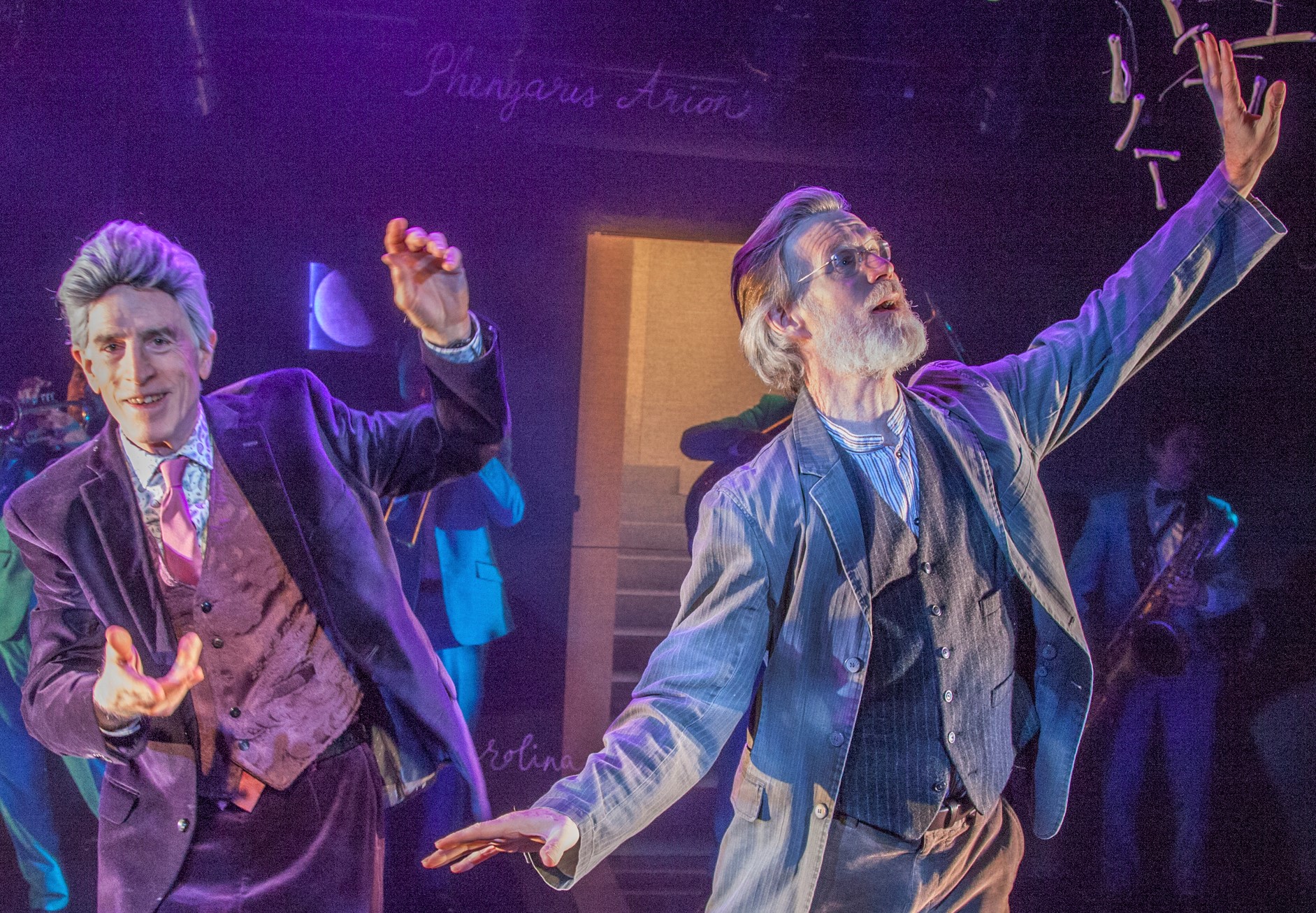An avant-garde, two-man show with five horn players, Fusiform Gyrus is like sliding down a long chute. It’s a reckless and even fun adventure, but you’re totally unsure of where you’ll end up. Written by Obie Award–winning Ellen Maddow and directed by Ellie Heyman at HERE Arts Center, Fusiform Gyrus is a meditation on life, death, and everything in between.
Dr. Decker (Paul Zimet, left) and his friend Aiden Grey (Tom Nelis) have an “intellectual romance.” Top, from left: Jessica Lurie (baritone sax), Zimet, Nelis, and Sam Kulik (tuba).
When the play begins, Aiden Grey, a tall man in a large fur hat, enters the room and greets another man, Dr. Fred Decker, with laughter. An inside joke? A laughing match? A showdown? The laughter gathers, then stops. Aiden and Decker (played with wit, dexterity and humor by Tom Nelis and Paul Zimet, respectively) share an obsession with naming things. After all, they are scientists. They are joined on stage at times by the Talking Band, a quintet of horns, which provides music that the men sing and dance to. According to the program, a fusiform gyrus is a region in the brain that lights up with activity during brain imaging, when people describe and give names to living things. When a low hum starts, they ask each other, “What do we call it?” It’s a question that is central to the play.
The play was inspired, in part, by the relationship and “intellectual romance” between two Israeli psychologists, Daniel Kahneman and Amos Tversk, though it isn’t biographical. Instead, Maddow took the premise to explore the “intellectual romance” of two friends. The discussion of science is broadened by a meditation on friendship, especially in old age, that intersperses their quest to give things the right taxonomy.
We learn from Decker that Aiden was forced into retirement when his lab was closed down. However, when Aiden confronted the powers that be, his efforts were misconstrued and he was ostracized by everyone, even those in his community. Aiden was a brilliant scientist, with a nearly mystical gift for understanding the life of insects, but ignorant of how to interact and communicate with others. When Decker says that Aiden is now reading Russian literature so that he can better understand people, it feels like an inside joke, but one that’s offered to make out of it our own meaning.
Decker and Grey with Peter Zummo (left, holding a trombone) examine a clue given by their favorite friend, “Anne Green.” Photographs by Suzanne Opton.
Maddow’s writing is erudite but never dry. It has a cyclical form that, at times, deconstructs ideas and builds on them so that a dense idea is picked apart like a thread. Other avant-garde devices are the use of physical and verbal repetition. When the two men watch a video from an old friend, Anne Green (Kim Gambino, who only appears in the video), talking to her husband, the audio is poor, and the men fill in with their own voice-overs. They take turns playing the roles, and one scene is replayed three times, each time taking on new meaning. Sometimes there’s solace in repetition, but it can also be an irritant, leading to misunderstanding, and the men turn on each other unexpectedly. The tension is heightened by the horns, played by Chris DiMeglio (trumpet), Lathan Hardy (alto sax), Sam Kulik (tuba), Jessica Lurie (baritone sax) and Peter Zummo (trombone), who lambaste Decker one horn at a time. There is a sadness in his reflection on aging and death once left alone. “Lately,” he says, “I feel more like bones.”
The set design (Anna Kiraly who also did the video) is pared down to a desk, chair, a chalkboard that is rolled on and off intermittently, and a simple black scrim. Together with the lighting (Mary Ellen Stebbins), it gives the small stage multiple dimensions: the scrim becomes a solid wall without light, but when lit from behind, it seems as if there are more rooms, more stage space, and a place for the musicians to come and go.
The many absurd and hilarious moments in the play don’t upstage the deeper reflections. But this is not a Chekhov play where, in the end, the characters are stymied by inaction. Instead, they continually come together in their quest to understand and give the things around them, even feelings, a label. “What do we name it?” they ask over and over, which keeps these two on a magic carpet ride of intellectual discovery.
Talking Band’s Fusiform Gyrus runs Tuesdays through Saturdays at 7 p.m. and Sundays at 2 p.m. at HERE Arts Center (145 Sixth Ave.; entrance on Dominick). Tickets are $30 students, $20 and are available by calling (212) 352-3101 or visiting here.org.





